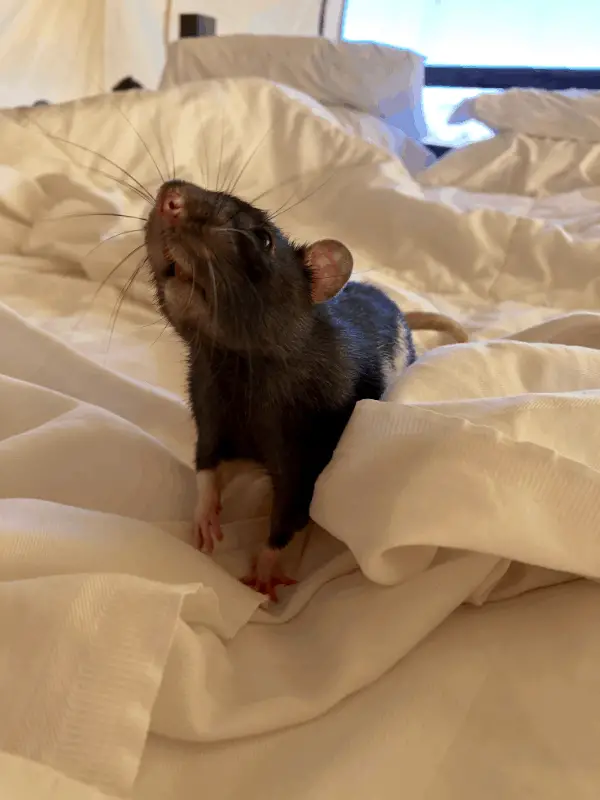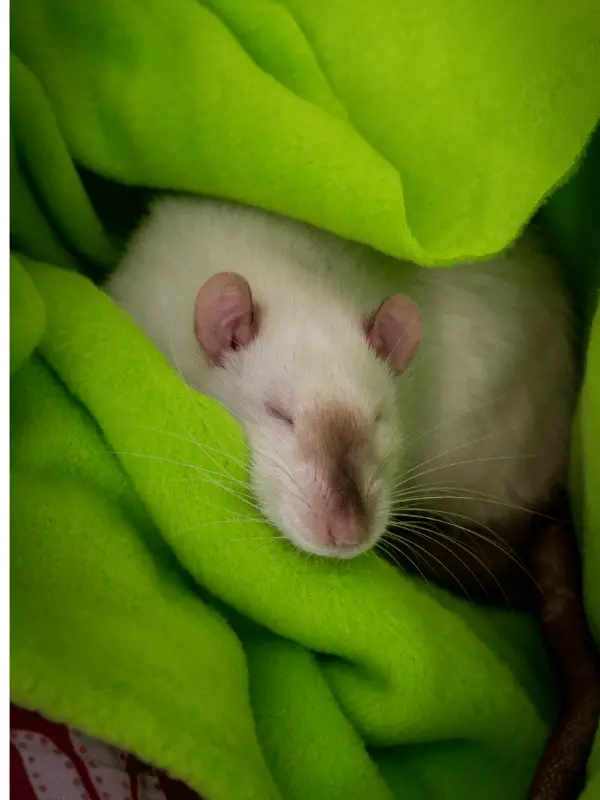This article contains affiliate links, and we may earn a commission at no cost to you if you choose to purchase through these links. I never recommend products that I do not trust or will not advise my veterinary clients and patients to use.
Pet rats love to cuddle just as much as they love to sleep. So why not let them have access to your bed for all the cuddles and sleep they want? After all, pet rats have been compared with dogs in many ways, surely they will enjoy sleeping by your feet on a cold winter’s night?
It is not advised to let your pet rat sleep in your bed. Rats are most active at night and might run off exploring or chewing on hazardous objects while you are asleep. There is also a risk that you might lie on and crush your rat, as well as an increased risk of contracting certain diseases carried by rats.
Sharing your bed with your pet rat might not be the best idea. Let’s have a look at why and what better ways there are to bond with your pet rat.

Rats are Nocturnal
This means that they are most active during nighttime. When you are having your best snooze in the middle of the night, your pet rat might just find snoring rather boring and want to go on an exploration adventure of your bedroom.
This can get them in heaps of trouble, including potentially chewing electric wires, getting stuck or lost, or running into another household pet that might not be as happy to find them. If you have cats, dogs, or snakes in or around your home – pets or not, it is best to never let your rat run around unsupervised.
Rats are excellent at squeezing through small cracks or under doors and they might just find themselves lost and face to face with an unfriendly foe.
I know of more than a few tragic stories of rat owners leaving their rat enclosure open during the night and then either never seeing their rat again or finding that their rat made a fatal mistake by chewing on the wrong wire.
Rats Love to Chew
Rats’ 4 incisors continue to grow throughout their lives. This means that they continually need to nibble in order to keep them short and in good working condition. If Rats do not chew, their teeth become overgrown causing painful tooth and jaw problems. Unfortunately, there is not much you can do in order to deter a rat’s urge to chew.
One rat owner that wanted to see what his pet rat would do if he kept her in his bed for the night, came to find her having chewed an entire rat-sized hole in his mattress to make a nest for herself. Apparently, she did not like the bedding arrangements and ended up creating her own nest. Now he has one very expensive customized rat bed
You might just come to find that your sheets will end up having a few extra unplanned ventilation holes as well.
Raisins and Rain Drops
Rats can be taught to use a litter box but even that is not 100% every time. I know of some rat owners who have successfully navigated this obstacle with litter-box trained rats by putting the cage on the bed. These smarties will then run back to their cage for a toilet break when needed.
Although this point can arguably be managed well with litterbox training, some rats, and especially intact male rats, will be tempted to mark new territory. I think most will agree that they would rather not have their sheets smell of rat urine.
Rats are Tiny Compared to Humans
They do not have much of a chance if they end up in the wrong spot at the wrong time. Unless you are an extremely light sleeper, I would rather just not take this risk. It just takes one wrong move in your sleep to crush your rat which, if not fatal, can lead to very serious injuries.

Your Rat can Make You Sick
I love rats and we know they are extremely clean animals. Although the risk is relatively low, as a vet, this is something that is worth mentioning. There are a few diseases and infections that you can contract from your pet rat. Most of them are rare and carry a low risk for healthy individuals, but some of them can be potentially fatal.
The recently most notable disease that can be contracted by humans from rats is Seoul Virus. In 2017, the first-ever outbreak in North America and Canada of this virus leads to the spread of the virus to 11 states.
Seoul virus is carried by rats and, if mild, causes flu-like symptoms in humans, but can cause fever and kidney damage in severe cases. It is spread to humans through the urine or feces o rats but can also be contracted by breathing in tiny particles stirred up by cleaning cages. Luckily, the last case of the Seoul virus was Diagnosed in April 2017.
A few other diseases worth mentioning here are leptospirosis which is not a deadly disease but can leave you feeling unwell for a good three weeks with unpleasant symptoms such as fever and vomiting. In severe cases, it can cause kidney failure or meningitis.
Salmonella and rat-bite fever are two bacterial diseases that humans can contract from being in contact with rats. You can read more about the different diseases humans can contract from rats in this article by Washington State University.
Luckily most of these dangers can be avoided by practicing good basic hygiene. Simply washing your hands after playing with your rats and thoroughly cleaning their enclosure at least once a week will stave off most of the risk. Also, be sure to keep their vaccinations and parasite control up to date.
The Best Ways to Cuddle and Spend Time With Your Pet Rat
Individual rats have unique likes and dislikes so this may vary widely depending on the personality of your pet rat, but here are three of the best ways I use to spend time with and provide some fun for my rats.
1. Let Them Explore a New Space
Personally, I don’t ever let my pet rats roam in the house unsupervised, for reasons mentioned previously in this article, but they do love to explore new areas every now and then. The next, safer option would be to get a plastic kiddie pool and fill it with toys, tunnels, boxes, and chewable objects for them to enjoy. A roll of toilet paper provides hours of fun as they shred it up and stuff it into every nook and cranny they can possibly find. Plus, it’s much easier to clean up the toilet paper mess if it is made inside the confines of the kiddie pool.
2. Use a Bonding Scarf
A Bonding scarf is a scarf with a pouch for your rat to sit in. It provides them with a safe warm place to relax while being close to you. This is a great way to help your rat to build trust and for you to spend supervised time with your rat. You can make your own bonding pouch using a template on the internet or you can just as easily buy them on amazon.
The video below is an example of a rat in a bonding pouch.
3. Play Music to Your Rats
Some rats do not like sitting still and are constantly on the move and exploring. If this sounds like one of your rats, then music may be an excellent way to add to your rat’s day. Try playing different types of music and watch how they respond to it. You might be surprised to find out what kind of music your pet rat likes. You can read more about the benefits of playing music to pet rats in this article.
Conclusion
Letting your pet rat sleep in your bed is not a good idea, Rather use other ways to bond with your rat or allow them to explore new territory. The risks of having them in your bed while you are asleep are just far too significant to justify and it is much safer to lock them in their enclosure with ample bedding at night.

